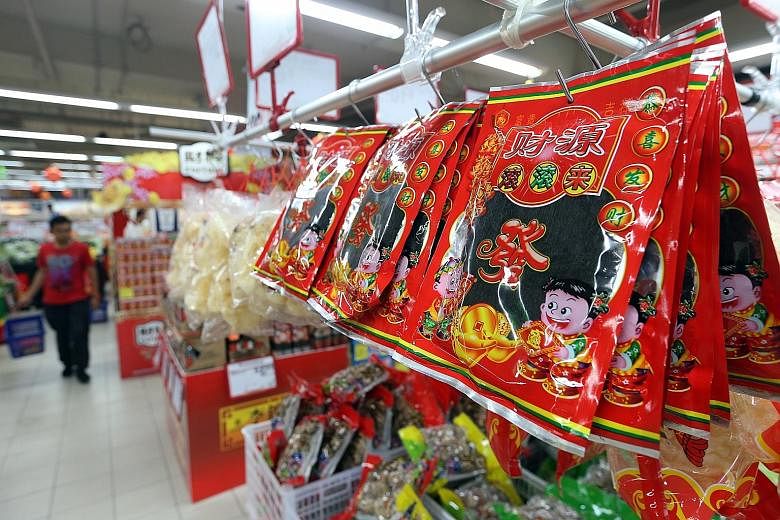The Chinese New Year delicacyfa cai, or black moss, is becoming a rarity in Singapore.
Only 30kg were imported last year, according to figures from the Agri-Food & Veterinary Authority of Singapore (AVA).
This is a fraction of the 140kg imported in 2014 and 800kg in 2013. At the peak of its popularity a decade ago, more than two tonnes were imported annually, mostly during Chinese New Year.
The hair-like fa cai, which grows in desert areas, is often used as an ingredient during the festive period as its Chinese name - which translates literally to "hair vegetable", given its appearance - sounds like "to strike it rich" in Mandarin.
-
HOW TO TELL IF THE FA CAI IS REAL
-
• Inspect it closely: Real fa cai is dark green, while the counterfeit product appears totally black.
• Soak it in water: Fake fa cai will leave the water with a yellowish or black tinge after a few hours.
• Test it with iodine: Iodine will turn from brown to an intense blue-black colour when it comes into contact with fake fa cai, which is typically made from starch.
Importers put its decline down to several reasons:
- Dampened demand after Hong Kong researchers reportedly found a toxic amino acid in it that could affect nerve-cell function and cause diseases such as Alzheimer's and Parkinson's. However, no link has been found between the amino acid and neurological damage;
- Proliferation of imitation black moss on the market; and
- AVA's stringent checks on imports of the item.
Media reports have suggested that a lot of black moss on the market - up to 35 per cent - may not be the real thing, but a starch-based imitation. A past study in Hong Kong, for instance, found that 14 out of 40 samples sold there were fake.
Most of Singapore's imported black moss products are from China and Hong Kong, and they cost about $150 per kg.
This, as well as stringent checks in Singapore, has led to a headache that importers would rather avoid.
An AVA spokesman said the agency tests black moss products routinely for "adulteration with cheaper or inferior ingredients".
"Black moss products that fail our tests will not be allowed for sale," she said, adding that enforcement action was taken against 15 importers for peddling counterfeit black moss from 2011 to last year.
Ban Yoo Foh, a Chinese medicine store in Chinatown, stopped selling fa cai last year. Its sales manager, Mr Derrick Lim, 60, said the imitations on the market meant they had to do extra checks on supplies.
He said: "We buy from reputable companies, but we still have to double check rather than risk selling our customers an inferior product.
"It was hard work. We felt it was not worth it, and demand for fa cai is also falling because many young people don't eat it."
Supplier Teck Sang also stopped selling it last year, but declined to give a reason.
Other stores such as On Tai Ginseng Traditional Medical Hall in South Bridge Road are continuing to sell the item.
Owner Katherine Chow said: "I have been selling it for many years and there hasn't been a problem."
Restaurant chains Crystal Jade and Imperial Treasure are also still serving fa cai in their Chinese New Year dishes such as pen cai, a "treasure pot" filled with seafood.
A Crystal Jade spokesman said: "We have a longstanding relationship with our reliable suppliers and therefore have no issues procuring fa cai this year."

